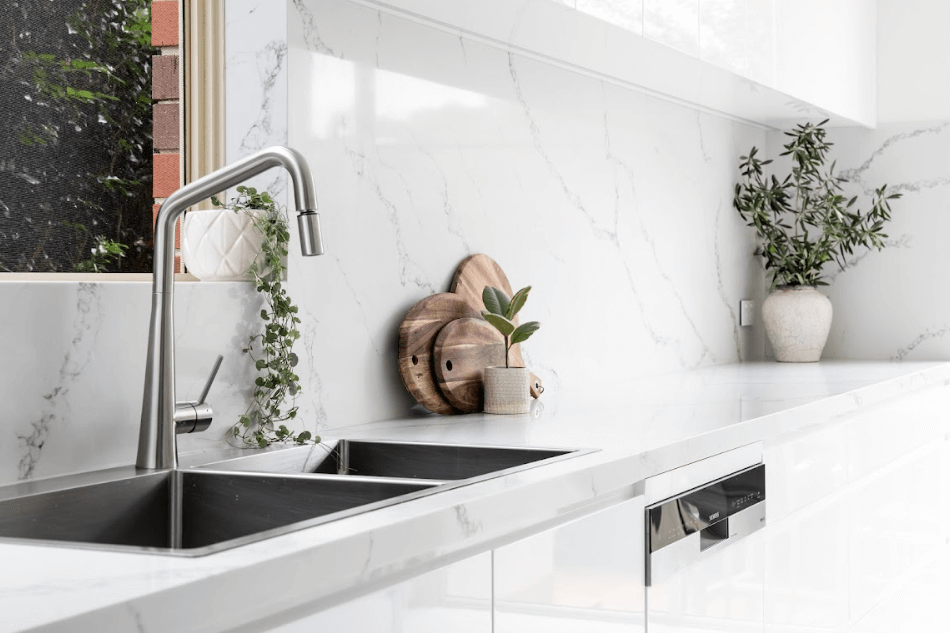
When you decide to renovate your kitchen or bathroom, choosing the right countertop material is one of the biggest decisions in terms of both aesthetics and functionality. Among the many options available, granite and quartz are the most common due to their durability, beauty, and range of colors. However, selecting between these two popular materials can be difficult. Here, we hope to educate you on the benefits of quartz or granite, the overlay process, and the differences between natural and engineered stones, ultimately helping you make an informed decision.
The Popularity of Quartz
Quartz countertops have risen to popularity for good reason. Classified as a man-made, or engineered stone, quartz offers a wide variety of colors and patterns that mimic the look of natural stone, but with enhanced durability and less maintenance. Quartz countertop overlays contain some natural stone mixed with polymer resins, making this a product that stands out for its non-porous surface that is resistant to stains, bacteria, and scratches. Today, many homeowners are selecting quartz countertop overlays to go over their original granite countertops, for less maintenance and a more modern, uniform look.
Understanding the Overlay Process
The overlay process is an interesting aspect of countertop installation, particularly when it comes to engineered stone like quartz. This process involves applying a thin layer of quartz over existing countertops, offering a cost-effective way to upgrade your kitchen or bathroom without the need for a complete overhaul. The result is a seamless, durable surface that looks just like solid stone, providing a fresh and modern update to any space. The time involved also saves on costs, since you have less downtime and a nice, new countertop in a quick and efficient manner.
Benefits of Granite Options
Granite, a natural stone, is known for its unique beauty, with each slab offering a one-of-a-kind pattern. The range of granite colors is vast, from subtle whites and grays to rich blues, greens, and reds, allowing for personalized design choices that can complement any decor style. In addition to its aesthetic appeal, granite is heat resistant and, if properly sealed, can also be relatively stain and scratch-resistant.
Natural vs. Engineered Stone
The choice between natural and engineered stone countertops involves considering aesthetics, maintenance, and durability. Natural stones, like granite, offer unique patterns and colors that only nature can create, giving your countertop a distinct look. However, they require more maintenance, including regular sealing to prevent stains and damage.
Engineered stones, such as quartz, provide a more uniform appearance and come in a wider variety of colors and patterns. They are designed for easy maintenance, durability, and resistance to stains and scratches, making them a practical choice for busy households.
Price Considerations
One common misconception is that granite is always more expensive than quartz. While granite can be cheaper than quartz, the price can vary widely depending on the rarity of the granite color and pattern you choose. Generally, quartz tends to have a higher price point due to its manufacturing process and the benefits it offers in terms of durability and maintenance. However, granite comes with its own costs in resealing and maintaining the stone that you won’t experience with a quartz countertop overlay.
Making the Choice: Granite vs. Quartz Countertops
The decision between granite and quartz countertops ultimately depends on your personal preferences, lifestyle, and budget. If you enjoy the unique beauty of natural stone and don’t mind a bit of maintenance, granite might be the right choice for you. On the other hand, if you prioritize durability, ease of maintenance, and a consistent appearance, quartz countertops will be more aligned with your needs, offering both a practical solution and a modern look.
Both granite and quartz countertops offer their own set of advantages. By understanding the differences between these materials, the overlay process, and the benefits and downsides to each material, you can make an informed decision that meets your practical needs and aesthetic desires, ensuring that your countertops not only look great but also stand the test of time, both in function and in form.


